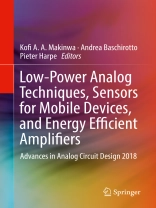This book is based on the 18 invited tutorials presented during the 27th workshop on Advances in Analog Circuit Design. Expert designers from both industry and academia present readers with information about a variety of topics at the frontiers of analog circuit design, including the design of analog circuits in power-constrained applications, CMOS-compatible sensors for mobile devices and energy-efficient amplifiers and drivers. For anyone involved in the design of analog circuits, this book will serve as a valuable guide to the current state-of-the-art.
Provides a state-of-the-art reference in analog circuit design, written by experts from industry and academia;
Presents material in a tutorial-based format;
Covers the design of analog circuits in power-constrained applications, CMOS-compatible sensors for mobile devices and energy-efficient amplifiers and drivers.
Table des matières
Introduction.- Hybrid Data Converters.- Hybrid and Segmented ADC Techniques to Optimize Power Efficiency and Area. The Case of a 0.076mm2 600MS/s 12b SAR-DS ADC.- Interleaved Pipelined SAR ADCs: Combined Power for Efficient Accurate High-Speed Conversion.- Hybrid VCO-based 0-1 MASH and Hybrid DS SAR ADCs.- Hybrid Architecture for Reconfigurable SAR ADC.- A Hybrid ADC for High Resolution: the Zoom-ADC.- Advances in Bio-Medical Sensor Systems for Wearable Health.- An Ultra-Low Power, Robust Photoplethysomographic Readout Exploiting Compressive Sampling, Artifact Reduction and Sensor Fusion.- A 32k Hz-DTCXO RTC Module with an Overall Accuracy of ±1ppm and an All-Digital 0.1ppm Compensation-Resolution Scheme.- Energy-Efficient High-Resolution resistor-based temperature sensors.- Ultra-Low Power Charge-Pump-Based Bandgap References.- An Energy-Efficient Integrating Dual-Slope Capacitance-to-Digital Converter.- FD-SOI Technology, Advantages for Analog/RF and Mixed-Signal Designs.- Pipeline and SAR ADCs for Advanced Nodes.- Time-Based Biomedical AFE Readout in Ultra-Low Voltage, Small-Scale CMOS Technology.- An Ultra-Low Power Bluetooth Low-Energy Transceiver for Io T Applications.- Analog/Mixed-Signal Design in Fin FET Technologies.- Analog design in 14nm and 28nm.
A propos de l’auteur
Kofi Makinwa holds degrees from Obafemi Awolowo University, Ile-Ife (B.Sc., M.Sc.), Philips International Institute, Eindhoven (M.E.E.), and Delft University of Technology, Delft (Ph.D.). From 1989 to 1999, he was a research scientist at Philips Research Laboratories, where he designed sensor systems for interactive displays, and analog front-ends for optical and magnetic recording systems. In 1999 he joined Delft University of Technology, where he is currently an Antoni van Leeuwenhoek Professor of the Faculty of Electrical Engineering, Mathematics and Computer Engineering and Chair of the Electronic Instrumentation Laboratory. Dr. Makinwa holds 18 patents, and has authored or co-authored 4 books and over 170 technical papers. He is on the program committee of the European Solid-State Circuits Conference (ESSCIRC) and the workshop on Advances in Analog Circuit Design (AACD). He has also served on the program committees of the International Solid-State Circuits Conference (ISSCC), the International Conference on Solid-State Sensors, Actuators and Microsystems (Transducers) and the IEEE Sensors Conference. He was a distinguished lecturer of the IEEE Solid-State Circuits Society (2008 to 2011) and a guest editor of the Journal of Solid-State Circuits (JSSC). He has given invited talks and tutorials at several international conferences including ISSCC, ESSCIRC, ASSCC and the VLSI symposium. At the 60th anniversary of ISSCC, he was recognized as one of its top ten contributing authors.
For his Ph.D. research, Dr. Makinwa was awarded the title of ‘Simon Stevin Gezel’ by the Dutch Technology Foundation (STW). In 2005, he received a VENI grant from the Dutch Scientific Foundation (NWO). He is a co-recipient of several best paper awards: from the JSSC (2), ISSCC (4), ESSCIRC (2) and Transducers (1). He is an IEEE Fellow, an alumnus of the Young Academy of the Royal Netherlands Academy of Arts and Sciences (KNAW) and an elected member of the Ad Com of the IEEE Solid-State Circuits Society.
Andrea Baschirotto graduated in Electronic Engineering (summa cum laude) from the University of Pavia in 1989. In 1994, he received the Ph.D. degree in electronics engineering from the University of Pavia. In 1994, he joined the Department of Electronics, University of Pavia, as a Researcher (Assistant Professor). In 1998, he joined the Department of Innovation Engineering, University of Lecce, Italy, as an Associate Professor. In 2007, he joined the Department of Physics, University of Milan-Bicocca, Italy, as an Associate Professor. Pieter Harpe received the M.Sc. and Ph.D. degrees from the Eindhoven University of Technology, The Netherlands. In 2008, he started as researcher at Holst Centre / imec, The Netherlands. Since then, he has been working on ultra low-power wireless transceivers, with a main focus on ADC research and design. In April 2011, he joined Eindhoven University of Technology as assistant professor on low-power mixed-signal circuits. Since 2012, he is co-organiser of the yearly workshop on Advances in Analog Circuit Design (AACD). In 2013, he became member of the Technical Program Committees of ISSCC and ESSCIRC. In 2013, he received a 250.000euro `VENI’ grant from the Dutch Technology Foundation STW for research on multi-functional ADCs.












